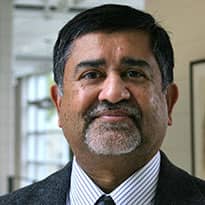These days when it seems everyone is talking, and everyone else is relaying whatever everyone is talking about, truth seems to be scarce and difficult to find, even at a premium. And since everyone is talking, the media, which once acted as gatekeepers and minders of truths, now find that the only way to get the attention of the jabbering masses accustomed to "free newspapers" and "limitless talking" is to resort to hyperbole, to add "masala" to bland news, and to curry the favors of their distracted and disgruntled "fly by" readers.
And when everyone can weigh in on anything and usually does, the experts, the scholars, and the careful observers also have to do their trapeze acts to get the attention that they once had taken for granted. So it is that I read The New York Times these days with a chuckle, when there is a long analysis on how yoga can wreck your body, and why you better not take it up at all, or whether yoga is for narcissists, and wonder whether the "Old Gray Lady" has just become even more of an old curmudgeon or whether she has begun to wear her blouse low, in her old age, so that like the rest of them, she too can display her cleavage and get some attention from some chance passersby!
And so it is too that I find an economics professor, an Indian to boot, indulging in the kind of juvenile analysis of the Bhagavad Gita that only juveniles do, or either fundamentalist Bible thumpers used to do, or snide "Hinduism experts" did hiding behind "I was misquoted" excuses. The economist and professor emeritus at the London School of Economics, Lord Meghnad Desai, held forth on the sacred Hindu treatise, and questioned his fellow Gujarati, Mahatma Gandhi's, endorsement of the Bhagavad Gita. Desai, an avowed atheist, and now it seems an avowed demagogue, was speaking on "Gandhiji's views on violence," at the twelfth Prof. Ramlal Parikh Memorial Lecture series. We do not know how the old, the wizened, and the very Gujarati audience in India responded to Desai's "literal," and it seems superficial reading of the Gita, or to the criticism of the most well-known Gujarati and proponent of non-violence by a frizzy-haired Gujarati "Lord" of whom very few Indians have heard or know about.
Below is a summary of Desai's commentary on Mahatma Gandhi, and more dangerously, against the Bhagavad Gita:
"Bhagavad Gita justifies violence," he said, and ". . . if it does so, then why did Gandhiji approve of it?"
"Gandhi argued that Arjuna was blinded by his relationship with the opponent during the Mahabharata war, which was nothing less than a holocaust . . . Arjuna (in Gandhi's opinion) deserved to be re-educated by Krishna that killing was his 'Dharma' (duty) and not a bad thing."
"Is there a justification in casting Arjuna as if in darkness? Gandhiji singling out the relationship angle as the objection to Arjuna's doubt is what I find surprising."
"Gandhiji's over-all attack on Arjuna's reluctance to kill is which I think is not proper. . . . Argument that killing does not matter because you are duty-bound to do it is a highly dangerous argument."
One wonders if Dr. Desai did his homework, and if he did, countered the evaluations by men and women greater than him, including Mahatma Gandhi, on the true nature and import of the Gita. Here is just a small selection of what others, more sagacious than Desai, have said about the Bhagavad Gita:
- "In the morning I bathe my intellect in the stupendous and cosmogonal philosophy of the Bhagavad Gita, in comparison with which our modern world and its literature seems puny and trivial."—Henry David Thoreau
- "The Bhagavad Gita is an empire of thought and in its philosophical teachings Krishna has all the attributes of the full-fledged montheistic deity and at the same time the attributes of the Upanishadic absolute."—Ralph Waldo Emerson
- "The secret of karma yoga which is to perform actions without any fruitive desires is taught by Lord Krishna in the Bhagavad Gita."—Swami Vivekananda
- "From a clear knowledge of the Bhagavad-Gita all the goals of human existence become fulfilled. Bhagavad Gita is the manifest quintessence of all the teachings of the Vedic scriptures."—Shri Adi Shankara
- "When I read the Bhagavad Gita and reflect about how God created this universe everything else seems so superfluous."—Albert Einstein
- "The Bhagavad Gita has a profound influence on the spirit of mankind by its devotion to God which is manifested by actions."—Dr. Albert Schweitzer
- "The Bhagavad Gita is a true scripture of the human race a living creation rather than a book, with a new message for every age and a new meaning for every civilization."—Shri Aurobindo
- "The marvel of the Bhagavad Gita is its truly beautiful revelation of life's wisdom which enables philosophy to blossom into religion."—Herman Hesse
- "The Bhagavad Gita is the most systematic statement of spiritual evolution of endowing value to mankind. It is one of the most clear and comprehensive summaries of perennial philosophy ever revealed; hence its enduring value is subject not only to India but to all of humanity."—Aldous Huxley
- "In order to approach a creation as sublime as the Bhagavad Gita with full understanding it is necessary to attune our soul to it."—Rudolph Steiner





